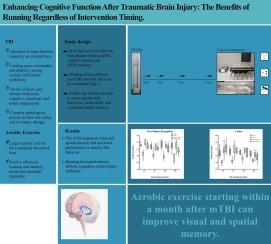Enhancing cognitive function after traumatic brain injury in male mice: The benefits of running regardless of intervention timing
IF 4.6
2区 医学
Q1 NEUROSCIENCES
引用次数: 0
Abstract
The significant benefits of physical activity are well-documented in academic literature, with growing evidence highlighting its positive effects (among others) on memory and cognitive function. Exercise, particularly aerobic activities, has been shown to mitigate neuroinflammatory processes, promote neuronal regeneration, facilitate recovery from cerebral trauma, and reduce the risk of neurodegenerative diseases. Among neurological conditions, traumatic brain injury (TBI) is the most common in individuals under 50, with 80–90 % of cases categorized as mild traumatic brain injury (mTBI).
This study investigates the impact of exercise on visual and spatial memory deficits in mice following mTBI. ICR mice were subjected to a seventeen-day treadmill training protocol initiated at four different time intervals post-mTBI (2, 7, 13, and 30 days). A battery of specific behavioral tests was used to assess anxiety-like behaviors, motor skills, and visual and spatial memory.
Our results indicate that running positively affected mTBI in both novel object recognition (p < 0.001) and Y-maze (p < 0.001) regardless of the running protocol's initiation time, demonstrating that aerobic exercise significantly alleviates cognitive deficits associated with mTBI. Importantly, mTBI did not appear to impact motor abilities or anxiety-like behaviors based on the assessment paradigms utilized. In conclusion, aerobic exercise effectively enhances visual and spatial memory post-mTBI, with promising results observed even when the running protocol is initiated up to one-month post-injury.

增强雄性小鼠脑外伤后的认知功能:跑步的益处与干预时机无关
体育锻炼的巨大益处在学术文献中得到了充分的证明,越来越多的证据强调了体育锻炼对记忆和认知功能的积极影响(其中包括)。运动,尤其是有氧运动,已被证明可以减轻神经炎症过程,促进神经元再生,促进脑外伤后的恢复,并降低神经退行性疾病的风险。在神经系统疾病中,创伤性脑损伤(TBI)在 50 岁以下的人群中最为常见,其中 80-90% 的病例被归类为轻度创伤性脑损伤(mTBI)。本研究调查了运动对轻微脑损伤后小鼠视觉和空间记忆缺陷的影响。ICR小鼠在创伤性脑损伤后的四个不同时间间隔(2天、7天、13天和30天)接受了为期17天的跑步机训练。一系列特定的行为测试用于评估焦虑行为、运动技能以及视觉和空间记忆。我们的结果表明,跑步对 mTBI 的新物体识别(p
本文章由计算机程序翻译,如有差异,请以英文原文为准。
求助全文
约1分钟内获得全文
求助全文
来源期刊

Experimental Neurology
医学-神经科学
CiteScore
10.10
自引率
3.80%
发文量
258
审稿时长
42 days
期刊介绍:
Experimental Neurology, a Journal of Neuroscience Research, publishes original research in neuroscience with a particular emphasis on novel findings in neural development, regeneration, plasticity and transplantation. The journal has focused on research concerning basic mechanisms underlying neurological disorders.
 求助内容:
求助内容: 应助结果提醒方式:
应助结果提醒方式:


